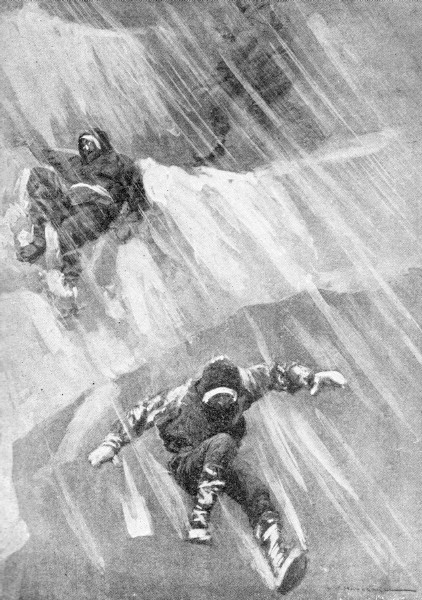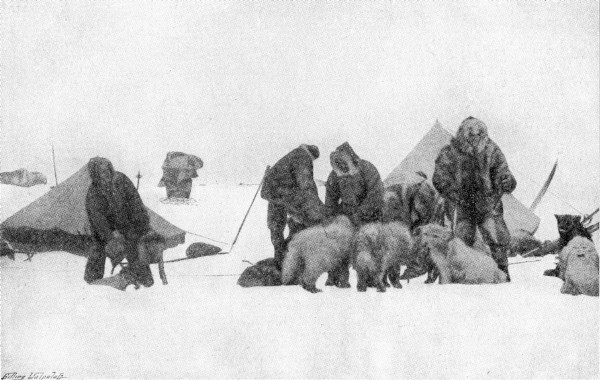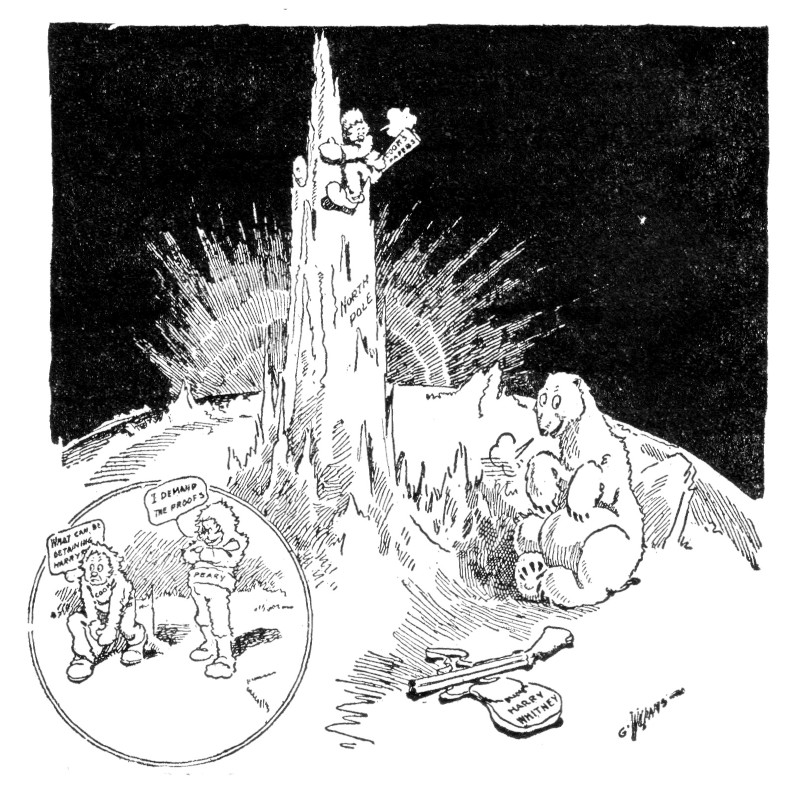| Web
and Book design,
Copyright, Kellscraft Studio 1999-2011 (Return to Web Text-ures) |
 (HOME)
|
| CHAPTER XXV.
COOK IN THE ANTARCTIC. For what he had of the lore of travel on ice-bound oceans, Dr. Cook owed much to his journey to the antarctic region in 1897. On that expedition he figured, as the medical man of a party of Belgian scientists, who sought to traverse and chart some of the dim, unknown lands on the "bottom of the world." As every reader knows, a venture into the far south is as perilous as a journey in the arctic. Indeed, the dangers are in some respect greater. The paths v/here a few men have trod are not so well known down there, and the cold is equally severe. Then, too, the south polar seas are much farther from any of the great centers of civilization. Countries of South America, themselves homes of comparative savagery, lie nearest to the "frozen south," instead of great seaports, with endless quantities of supplies. Woe betide the explorer who, tempest-tossed and with his soul almost frozen within him, seeks shelter on the bleak coast of extreme South America. Into this vast and terrifying region, however, Dr. Cook was chosen to go. With a large party of scientists and adventurers he left Antwerp in August, 1897. By January 23 of the following year the vessel had reached the Palmer archipelago, nearly at the limit of where men had penetrated. The party was seeking knowledge rather than attempting a pole-finding feat, and they gave much time to the exploration of five hundred miles of new land in the South Pacific. In the meantime winter came upon them, and though during many of the coldest months they succeeded in keeping clear of the drift, by March 4, 1898, they were fast in the ice in latitude 71 degrees, 22 minutes, and longitude 84 degrees, 55 minutes. This meant that they were to the southwest of South America, and about midway between that continent and the pole. Dr. Cook has thrillingly described their succeeding experiences. They drifted two thousand miles in a year. Says Dr. Cook: "Our acquaintance with the south polar pack ice dates from February 13, 1896, and ends with our escape on March 14, 1899. We first encountered it off the eastern border of Graham Land, before crossing the polar circle. Here it was broken into small pieces, mixed with many glacial fragments and studded by innumerable icebergs. While trying to keep the coast in view, we steamed among a number of streams of small fragments of drift ice. An on-shore swell forced the ice together, and we were hopelessly held for the night of the 13th. To the east of us were the high peaks and limitless glaciers of Graham Land. The country was visible for only short periods and in patches, for a high fog hung constantly over the land, leaving only an opening here and there. ''To the west the sky was perfectly clear. A dark smoky zone near the horizon indicated the limits of the ice and an open sea beyond. Those were of a size and type quite similar to those of the Arctic Sea. The entire mass — icebergs, sea-ice, and the ship — rose and fell with the gigantic heave of the South Pacific, and for a time it seemed as though we should be carried with the moving drift against one of a number of small islands. But a change in the direction of the wind on the following morning so separated the ice that we were able to force our way into the open sea westward. "After the first experience of the ensnaring powers of the drift ice, we did not easily put ourselves in a position to be again entangled. The season for a campaign to the far south was past, but M. de Gerlache, (one of the leaders of the expedition) thought it incumbent upon himself to make as strong an effort as possible to push into the main body of the pack and beat the "farthest south" of other explorers. The entire scientific staff were opposed to this effort, because it was thought to be too late in the season. No direct opposition, however, was offered when the 'Belgica' was headed southward. She was forced into the pack and out again, time after time, making after each rebuff a new effort farther westward. On February 28th, we were forced to take to the ice that the ship might better ride out a howling storm. "I can imagine nothing more desperate than a storm on the edge of the pack. At best it is a cold, dull and gloomy region, with a high humidity and constant drizzly fogs. Clear weather here is a rare exception. Storm with rain, sleet and snow is the normal weather condition throughout the entire year. "During the day of the 28th, we were unable to get a glimpse of the sun, and were in consequence in doubt as to our actual position. There was something about the sea and sky which promised a night of unusual terrors. The wind came in a steady torrent from the east, and with it came alternate squalls of rain and sleet and snow. Hour after hour it blew harder, and before night it brought with it a heavy sea studded with moving mountains of blackness. The 'Belgica' ran westerly before it, almost under bare poles and edged closer and closer toward the fragments of ice to the south, where the sea was easier. "The sky to the north and east was smoky and wavy, as if a number of huge fires were there sending out gusts of smoke. On the southern sky there was a bright pearly zone. This was an ice 'blink,' a reflection of the ice beyond our horizon upon the particles of watery vapor suspended in the air. As night came upon us it became necessary to choose between the forbidding blackness of the north and the more cheerful, but less hospitable whiteness of the south. With icebergs on every side, always in our course, coming as suddenly out of the thickening darkness as if dropped from the skies, it was not wise or prudent either to move out of it, or to rest in our position. To be more friendly with the ice, or to rid ourselves entirely of its companionship was plainly our duty. "We decided to seek the harboring influence of the pack, as an experiment; to ride out the increasing fury of the tempest. The 'Belgica' was headed southward and quickly ploughed through the icy seas, but the noise and commotion which came to a climax every time she rose to a crest of a great swell were terrible. The wind beat through the rigging like the blasts out of a blow-pipe, the quivering mass swept the sky with the regularity of a pendulum; the entire ship was covered with a sheet of ice. As the eye dropped over the side of the ship, the sea glittered with the brightness of a winter's sky. The brightness of the sea, with the sooty blackness of the heavens over it, formed a weird contrast never to be forgotten. Here and there were sparkling semi-luminous pieces of ice which sprang from the darkness with meteoric swiftness, and were again as quickly lost in the gathering blackness behind us. These fragments increased in number and size as we pressed poleward; but the 'Belgica' would strike and push them aside as a broom moves dust. "After a short but very exciting time, the pieces of ice became more numerous and of larger dimensions, and the birds were so closely grouped that further progress seemed impossible. The sea rolled more and more, in long, easy swells, as we passed through the ice. This eased the ship and made matters more comforting to the sufferers from seasickness. "I must hasten to confess that about one half of us were thus afflicted at this time, still we tried to be cheerful. I cannot imagine any scene more despairing, though, than the 'Belgica,' as she pushed into the pack during this black night. The noise was maddening. Every swell that drove against the ship brought with it tons of ice which was thrown against the ribs with a thundering crash. The wind howled as it rushed past us, and came with a force that made us grasp the rails to keep from being thrown into the churning seas. The good old ship kept up a constant scream of complaints as she struck piece after piece of the masses of ice. Occasionally we would try to talk, but the deafening noises of the storm, the squeaking strains of the ship and the thumping of the ice made every effort at speech inaudible. With our stomachs dissatisfied, and our minds raised to a fever height of excitement, and with a prospect of striking an iceberg at any moment and going to the bottom of the sea, we were, to say the least, uncomfortable. When we had entered sufficiently into the body of the pack, and were snugly surrounded by closely packed ice floes, the sea subsided, and here the overworked ship rested for night." And this is what the Belgica and her crew endured for more than a year! To further illustrate the woes of travel on shipboard in polar seas, there may be given here an experience of one of the parties in the last century. This was the crew of the Investigator, one of the ships that went north in an endeavor to find traces of Sir John Franklin's expedition. Says the description of this mishap: "It was a very narrow escape from destruction. A light breeze springing up the day after open water appeared among the floes, the pack to which the Investigator was attached began to drift. It was carried towards a shoal upon which a huge mass of ice was grounded. A corner of the pack came in contact with the great stationary mass with a grinding shock that sent pieces of twelve and fourteen feet square flying completely out of the water, and as the immense weight of the moving pack pressed forward, there was a sound as of distant thunder as it crushed onwards. The weight at the back caused an enormous mass to upheave in the middle of the pack, as though under the influence of a volcanic eruption. The great field was rent asunder, the block to which the Investigator was attached taking the ground and remaining fixed, while the lighter portion swung round and, with accelerated speed, came directly towards the vessel's stern. "To let go every cable and hawser which held her to the block was the work of a moment, for every one was on deck keenly on the lookout. The moving mass caught her stern and forced her ahead and from between the moving floe and the stationary mass. The two came into grinding collision, and the men on the deck of the vessel saw the great bulk to which they had been attached slowly rise. It went up and up until it had risen thirty feet above the surface and hung perpendicularly above the ship. It towered higher than the foreyard, presenting a spectacle that was at once grandly impressive but terribly dangerous, for if it fell over upon the Investigator she would be crushed to atoms. For a few moments the suspense was awful, till the weight of the floe broke away a mass from the great bulk, and it rolled back with a tremendous roar and rending and, with some fearful heaves, resumed its former position. But no longer could it withstand the pressure, and it was hurried forward with the rest of the floe, grinding along the bottom of the shoal.  COMMANDER PEARY AND HIS MEN CAUGHT IN A SNOWSLIDE.  PEARY'S SLEDGE EXPEDITION HELD UP BY OPEN WATER. "The pack having set in towards the shore, the only hopes of safety lay in keeping with the ice, for if the Investigator was pushed ashore by it there would be little chance of her ever floating again. She was consequently made fast again and carried along, though with a tremendous strain on her stern and rudder. It was discovered that the latter was damaged, but there was no possibility of unshipping it for repairs while the ice was moving. Towards the afternoon the wind having dropped, the drift became less, and for five hours the rudder received attention. "Scarcely had it been replaced when once more the ice began to move, and the crew saw that they were being forced directly upon a large piece of the broken floe which had grounded. Feeling certain that if the ship were caught between the grounded mass and the moving floe nothing could save her from being crushed to pieces, a desperate effort was made to remove the great mass. The chief gunner, provided with a big canister of powder, went on to the ice and' struggled over the rugged surface until he reached the stationary mass. He intended to lower the canister under the mass before exploding it, but the ice was too closely packed around it to permit of this being done. There was no time to consider any other plan, so he fixed the blast in a cavity and, firing the fuse, scrambled back to the ship. "The charge exploded just as the pressure of the floe was beginning to tell, and the result was apparently valueless. The Investigator by this time was within a few yards of the great mass, and there seemed to be no hope of escaping from the crush. Every one on deck was in a state of anxious suspense, waiting for what was evidently the crisis of their fate. "Most fortunately the ship went stem-on, as sailors term it, and the pressure was directed along her whole length instead of along her sides. Every plank seemed to feel the shock, and the beams groaned as the pressure increased. The masts trembled, and crackling sounds came from the bulwarks as she strained under the tension. Momentarily the men expected that she would collapse under them, when the result of the gunner's blast was made manifest. It had cracked the mass in three places, and the pressure of the ship's stem forced the cracks open. The liberation from the obstacle was at once evident as the mass slowly divided and, falling over, floated off the shoal. The cable holding the vessel to the floe parted as she surged forward and the ice-anchors drew out, while the blocks of ice, as they turned over, lifted her bows up out of the water and heeled her over; but the cheer which broke from the assembled crew drowned all other noise, for it was as though they had been snatched from the very jaws of death."  |